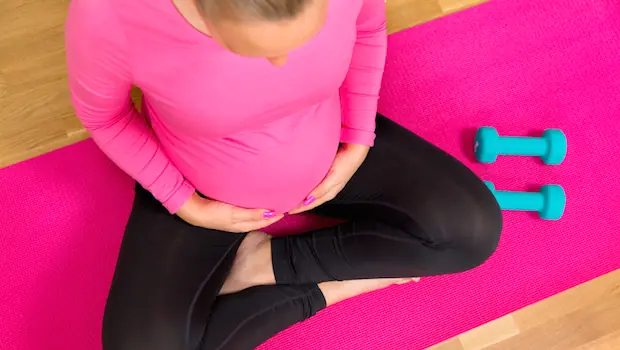
If you're pregnant (congrats!), you don't have to ditch your favorite cardio class or running route. But before you start working out for two, there are a few things to get straight—like what's totally off limits and how hard you should actually push your body while preggo.
Here are six facts every mom-to-be needs to know about exercising during pregnancy—straight from an ob-gyn and trainer who've been there.
Fitness Events Near You
1. You're Not Going to Set Any PRs
Now is not the time to try to get fitter, lose weight, or complete your first triathlon, says Julie M. Levitt, M.D., a 15-time marathoner, mom of two, and board-certified ob-gyn with the Women's Group of Northwestern in Chicago.
Instead, your main goal for the next nine months is to maintain your current fitness level.
As a general rule, during pregnancy you're good to perform any workouts that were part of your pre-pregnancy routine, but you should always talk to your doctor and a trainer familiar with your health before starting any new workouts or upping the intensity, she says.
2. Exercise Will Get Tougher
"During pregnancy, I was mostly surprised by how much harder exercise became," says Lynn Goff, C.S.C.S., mom of two and sports medicine coordinator at Professional Physical Therapy in New York, New Jersey, and Connecticut.
While hitting the road or your typical sweat sesh, you might notice that your muscles fatigue sooner or you get winded faster. That's because your center of gravity is ever-changing.
"It's like wearing a tool belt and adding large rocks into that tool belt every week while trying to keep up the same level of activity," she says.
And apart from the extra weight, your growing belly squishes your organs. So taking deep breaths becomes harder and frequent pee breaks become a must, says Levitt.
Don't worry about tracking your workouts or run paces. After all, if you stick with exercise through your pregnancy, you're already a badass.
More From Women's Health: Fitness Tracker Reviews
3. Modifications Are Your Friend
"Even hardcore fanatics will scale back—especially in the third trimester," says Levitt. And that's OK.
Feel free to reign in your exercise's intensity and duration, or give yourself longer rest breaks more frequently. Whatever you need, treat yourself.
"Planks are one of my favorite core stability exercises, but as I got further along in my pregnancy and put weight on, I modified it when I felt I was straining," says Goff.
So how do you know when to slow your roll? Besides the obvious "listen to your body" advice, we recommend giving the "talk test" a go.
"Can you carry on a conversation while exercising? If you can't talk, then you should pull back on your intensity," says Goff. Also, if you experience an increase in muscle or joint pain, feel excessively fatigued, or have trouble sleeping, it never hurts to talk to your doc to make sure your current workout is helping, not hurting, your health, she says.
More From Women's Health: The Truth About What Time of Day You Should Work Out



